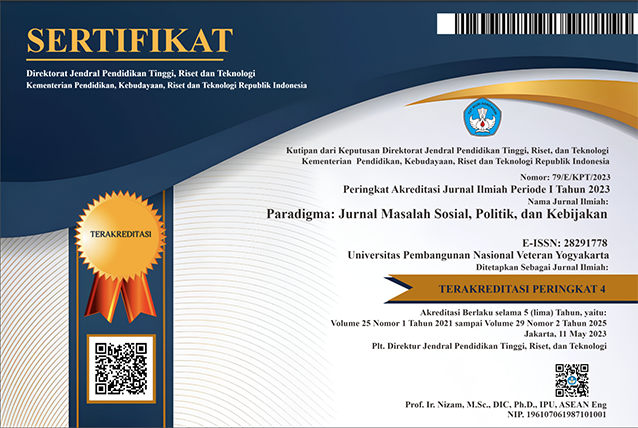Analisis Kesuksesan Inkubator dan Akselerator Bisnis Dalam Membangun Startup
DOI:
https://doi.org/10.31315/paradigma.v28i1.9934Keywords:
Startups, Incubators, and AcceleratorsAbstract
This study aims to determine the success of incubators and accelerators in building startups. This type of research is descriptive research with a qualitative approach. Data obtained through observation and in-depth interviews. The research data analysis technique was carried out using the Miles and Huberman model which consisted of three stages, namely; data reduction, data display, and conclusion/verification. Analysis activities are carried out from data collection to drawing conclusions. The results showed that PT Gama Inovasi Berdikari's assessment met the characteristics of the accelerator program including: Program Structure, Operational Features, Financial Capital & IP Rights, Social Capital & Networking. Next is the impact received by the assisted startups after participating in the accelerator program, namely: increasing education related to startups, having a forum or place for innovation related to startups, startups participating in the accelerator and incubator programs at PT Gama Inovasi Berdikari get quite a positive impact, get directions to run the company, looking for investors, from a legal perspective, providing support, managing investments, and maintaining valuations. Based on the results of the research, it can be concluded that PT GIB has succeeded in providing the program as desired by startups with programs that have been designed by PT GIB through the selection process, support services, and network owned by PT GIBReferences
Bakhar, M., Harto, B,. Gugat, Rudy M. D., Hendrayani, E., Setiawan, Z., Suriyanto, Dewi F., Salam, M. F., Suraji, Aji., Sukmariningsih, R. M., Sopiana, Y., Yusuf, M., Nugroho, W. E., dan Tampubolon, Lely P. D. (2023). Perkembangan Startup avit
Clarysse, B. & Yusubova. A. (2016). Success factors of business accelerators in three European cities : Paris, London, Berlin. Journal entrepreneurship and business
Colis, D, (2016) Lean Strategy, In Industrial engineering Online, Harvard Business Review, Vol. 35
Dempwolf, C. S., Auer, J., & D’ippolito, M. (2014), Innovation Accelerators: Defining Characteristics Among Startup Assistance Organizations. London: Optimal Solution Group, LLC
Dwi Rahmadiane, G., Unggul, E., Utami, S., & Anggraeni, T, (2022), Analisis Pertumbuhan Startup Bisnis di Kota Tegal, Managament Insight: Jurnal Ilmiah Manajemen ISSN, 17(2), 152–160
Grant, R.M., 1991. The resourcebased theory of competitive advantage, implications for strategy formulation. California Management Review, Spring, 114–135.
Habiburrahman, Prasetyo, A., Raharjo, T. W., Rinawati, H. S., Trisnani, Eko, B. R., Wahyudiyono, Wulandari, S. N., Fahlevi, M., Aljuaid, M., & Heidler, P. (2022), Determination of Critical Factors for Success in Business Incubators and Startups in East Java, Sustainability (Switzerland), 14(21).
Hardiansyah, R., & Tricahyono, D, (2019), Identifikasi Faktor-Faktor Kesuksesan Start Up Digital di Kota Bandung, Jurnal Ekonomi, Vol. 27, Hal. 134 - 145
Hardani dkk.. 2020. Metode Penelitian Kualitatif dan Kuantitatif. Yogyakarta: CV Pustaka Ilmu Group Yogyakarta
Mahani, S. A. E, (2019), Kinerja Pendampingan Usaha Rintis Binaan Pada Orangenest Incubiz. Jurnal Manajemen Dan Bisnis Performa, 16(1), 16–28
Prasetiawan&Tricahyono, D. (2017), The exploration of ınfluential factors toward competitive advantage on digital application startup: case study on ındigo ıncubator program of telkom. ISCLO, 17, hh. 193-209
Sugiyono, P. D. (2018). Metode Penelitian Bisnis. Bandung: Penerbit Alfabeta.
Syauqi, A. T (2016), Startup Sebagai Digitalisasi Ekonomi dan Dampaknya bagi Ekonomi Kreatif di Indonesia, Department of Electrical Engineering and Information Technology
Thu, Trang Nguyen (2018), How Do The Startup Accelerators Help The Start-ups To Scale?, Centria Univesity of Applied Sciences, Hal. 42
Winosa, Y. 2019. Ini Alasan 90 Persen Startup di Indonesia Gagal. https://wartaekonomi.co.id/read215393/ini-alasan-90-persen-startup-di-indonesia-gagal. Diakses pada 13 Maret 2023.
Wit, B., Dresler, P., & Surma-Syta, A. (2021a). Innovation in start-up business model in energy-saving solutions for sustainable development. Energies, 14(12).
Downloads
Published
How to Cite
Issue
Section
License
The manuscript submitted to Paradigma: Jurnal Masalah Sosial, Politik, dan Kebijakan journals are released under the license of Creative Commons Attribution-Non Commercial- ShareAlike (CC BY SA) if and when the article is accepted for publication.
We declare that:
- This paper has not been published in the same form elsewhere.
- It will not be submitted anywhere else for publication prior to acceptance/rejection by this Journal.
- A copyright permission is obtained for materials published elsewhere and which require this permission for reproduction.
Retained Rights/Terms and Conditions
Authors retain all proprietary rights to the published works, such as (but not limited to) the following rights:
- Copyright and other proprietary rights relating to the article, such as patent rights,
- The right to use the substance of the article in own future works, including lectures and books,
- The right to reproduce the article for own purposes,
- The right to self-archive the article
The right to enter into separate, additional contractual arrangements for the non-exclusive distribution of the article's published version (e.g., post it to an institutional repository or publish it in a book), with an acknowledgment of its initial publication in this journal Paradigma: Jurnal Masalah Sosial, Politik, dan Kebijakan



